Five things I learned on my literary tour of England
 This summer I had the opportunity to teach on C. S. Lewis and his apologetics for our seminary while at Oxford University. To teach on one of my favorite authors, in Oxford where he lived and taught most of his adult life, is a dream come true. To say I am a fan of Lewis is a bit of an understatement. I visited all the sites connected to Lewis—the Kilns where he lived, Magdalen college where he taught, The Eagle and Child where he so often ate, Holy Trinity Church where he worshipped and is now buried.
This summer I had the opportunity to teach on C. S. Lewis and his apologetics for our seminary while at Oxford University. To teach on one of my favorite authors, in Oxford where he lived and taught most of his adult life, is a dream come true. To say I am a fan of Lewis is a bit of an understatement. I visited all the sites connected to Lewis—the Kilns where he lived, Magdalen college where he taught, The Eagle and Child where he so often ate, Holy Trinity Church where he worshipped and is now buried.
This summer also marks the 20th anniversary of marriage to my bride Ethel and so we morphed the summer into a vacation-while-Paul-teaches trip. But, this was no beach vacation. We spent all of our free time visiting the homes, towns, and haunts of some of our favorite writers. In this post, I want to share with you five things I learned on my literary vacation in England (and Scotland).
First, writing is best done in community over food and drinks.
Below is a picture The Eagle and Child (more informally known as the Bird and Baby). This is the location where C. S. Lewis, J. R. R. Tolkien, Owen Barfield, Charles Williams, and others met at every Tuesday for almost two decades. What would they do? They would enjoy each other’s company, eat, drink, smoke, and read and discuss their unfinished works. Many of our favorite novels: The Lord of the Rings, Out of the Silent Planet, and more, were first read at these informal gatherings. These writers benefitted from the criticism, encouragement, and the collective imagination of the group. And so have we all. As an aspiring writer myself, I too have benefitted from the feedback, encouragement, and insight of friends, colleagues, and other writers who read my work. I have fond memories of when I lived in Indiana. Often my pastor (David Henderson) and I would sit on his back deck, staring into the woods, as we read out loud portions of current writing projects. Our writing improved, our friendship deepened, and some of those unfinished works have now been or will be published (for both of us). So, if you do any writing at all—term papers, blogs, twitter posts (!!), essays, or books—call up a friend, go out to eat, and read to each other. You won’t regret it.
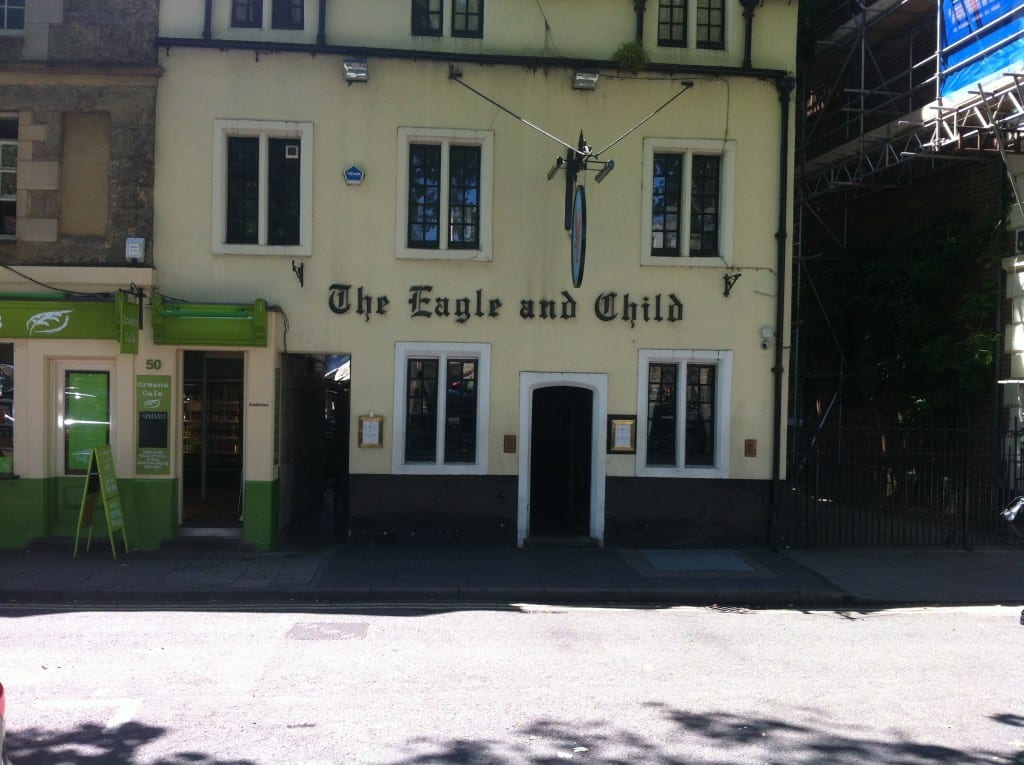
Second, beauty moves the soul and awakens the imagination.
England is a beautiful place. It is little wonder that poets and storytellers have long flourished in this country. As I walked the fields behind the Kilns taking in the ponds, the trees, the chirp of the birds and the buzz of the bees, my soul was aroused. I was awake, alive, enchanted. Sitting on the same bench Lewis and Tolkien did, looking at the ponds, I saw through Lewis’s eyes the mythical land between the ponds that you read about in The Magicians Nephew. Looking out the window at Edinburgh Castle while at The Elephant House, I saw Hogwarts through J. K. Rowling’s eyes (she wrote the first Harry Potter book while sipping coffee and staying warm at this café). As we visited the Lake District and walked the same crags that Wordsworth did, it is little wonder that he was inspired to write such wonderful poetry, such as “I wandered lonely as a cloud:”
I wandered lonely as a cloud
That floats on high o’er vales and hills,
When all at once I saw a crowd,
A host, of golden daffodils;
Beside the lake, beneath the trees,
Fluttering and dancing in the breeze.
My soul, like these writers, is moved by beauty. My imagination is stirred. My longing to live a life greater than self was aroused as I walked the same ancient streets and well worn trails as Lewis, Tolkien, Wordsworth, Austen or the Bronte sisters. My encouragement to you: take a fresh look at the world around you. Nothing is ordinary. Nothing is mundane. All is enchanted. All is infused with the glory of its Creator. Allow the beauty around you to awaken you to the Source of Beauty and to inspire you to live a beautiful life.
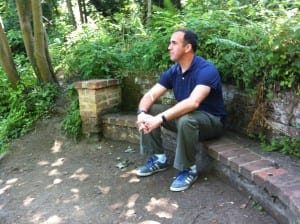

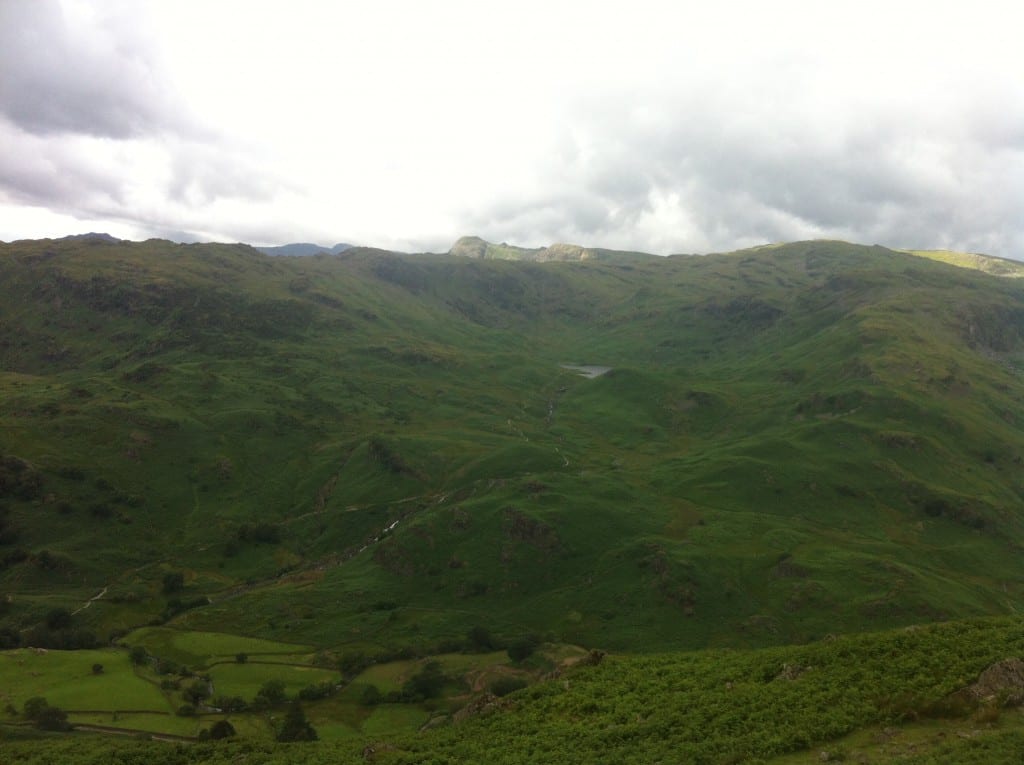
Third, a simple life can be a productive life.
We spent a day each at the homes of Jane Austen and the Bronte sisters. One of the things that struck me about their lives is their simplicity and solitude. Consider Jane Austen, who gave us masterpieces such as Pride and Prejudice and Sense and Sensibility, even as she only lived to be 43 years old. Her life was rather simple: write in the morning, long walk in the afternoon, read with family at night. No Facebook posts, no surfing the web, no TV, no weekly parties. Just ordinary, quiet, lives of industry, virtue, faith, and love. The Bronte sister’s life was the same. They also managed to achieve a great deal all within a very short amount of time before they too began to die at an early age. As we walked the hills around Chawton, we could imagine Austen mulling over the Bennett sisters predicament or Mr. Darcy’s nobility. As we walked a four-mile loop through the moors, we saw the world of Wuthering Heights through Emily’s eyes, and could envision how the story quickly moved from her mind to the pen after a long and peaceful walk. Learning about the lives of these writers has reminded me that in order to accomplish something, sometimes it is better to slow down. We weren’t meant to run every hour of the day. We need rest. Perhaps paradoxically, as Austen and the Bronte’s show us, in filling our lives with less, we can accomplish more.
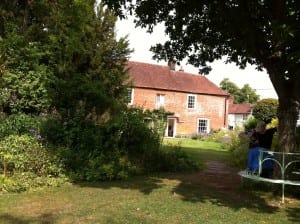

Fourth, to be a good writer, read.
All of the writers we explored were avid readers. From an early age, their hearts and minds were carried away to foreign lands full of drama, intrigue, evil and good, virtue and vice, adventure, comedy, tragedy, and more as they read stories. I’ve found in my own life that in order to be a good writer, I need to start by reading others. So too with you. If you are looking for guides, why not start with Lewis, Tolkien, Sayers, Williams, Wordsworth, Austen, the Brontes, Kipling, and Dickens. Watch how they turn a phrase or paint a verbal picture, and go and do likewise.
Fifth, take long walks everyday.
All of these authors walked. Everyday. For miles. As they walked, they talked, dreamed, thought, looked, listened, and prayed. And their lives were better for it. Not only is walking healthy (I say this as one who just got a fitbit) but it allows our minds to slow down. It provides us an opportunity to pull back from the pressing matters of the day and to gain our bearing or to realign our perspective, and to talk to God more intentionally. It allows us to slow down, to look up, and to be reminded of the fact that all of life is a gift from God. And as we remember, may we give thanks, and then go and live for something greater than the day to day. These writers did this, and they have inspired me to do likewise.
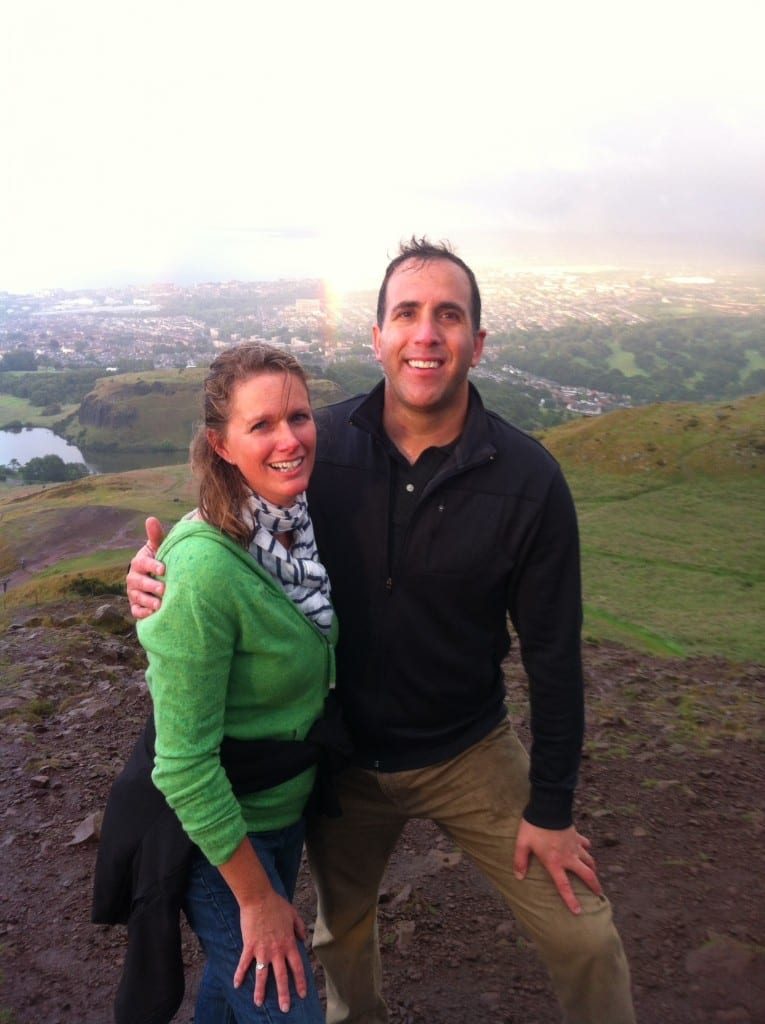
 Fueled by the conviction that stories sustain us because we were made to be nourished on the good, the true, and the beautiful, I determined to read one fiction book a month for this past year. And I read some very good stories! In addition to fiction, I have benefitted greatly this year from some solid works in philosophy, theology, biography, and spiritual formation. Without further ado, here are my favorite books read in 2023. As is custom, in my book log, I record the book title, author, and date completed, along with a one sentence description. This has been my practice since 2009. My book log now includes 635 entries. This year I read 43 books.
Fueled by the conviction that stories sustain us because we were made to be nourished on the good, the true, and the beautiful, I determined to read one fiction book a month for this past year. And I read some very good stories! In addition to fiction, I have benefitted greatly this year from some solid works in philosophy, theology, biography, and spiritual formation. Without further ado, here are my favorite books read in 2023. As is custom, in my book log, I record the book title, author, and date completed, along with a one sentence description. This has been my practice since 2009. My book log now includes 635 entries. This year I read 43 books. I love to read. Of course, being a professor helps. I get to read as part of my job. That’s good. But I also love to read for the sheer pleasure of it. When it comes to fiction, I love entering into secondary worlds and journeying along with the characters of the story. Often non-fiction reads like a good story too: life is life, story is story, and often the two kiss (a loose paraphrase of one of my favorite nonfiction stories of the year, All that is Sad is Untrue). (more…)
I love to read. Of course, being a professor helps. I get to read as part of my job. That’s good. But I also love to read for the sheer pleasure of it. When it comes to fiction, I love entering into secondary worlds and journeying along with the characters of the story. Often non-fiction reads like a good story too: life is life, story is story, and often the two kiss (a loose paraphrase of one of my favorite nonfiction stories of the year, All that is Sad is Untrue). (more…) I love to read. It’s partly why I’m an academic today. What could be better than reading, writing, teaching, and learning every day? Reading books awakens me: to truth, goodness, and beauty. I try, each year, to read broadly. This year, I managed to read 47 books. I’ve been recording every book read in a book log for over 10 years now. Whenever I finish a book, I list the date finished, the title, author, and a one sentence summary of the book. As has become my custom, I offer to you my favorite reads of the past year in philosophy, apologetics and theology, fiction, and non-fiction. (more…)
I love to read. It’s partly why I’m an academic today. What could be better than reading, writing, teaching, and learning every day? Reading books awakens me: to truth, goodness, and beauty. I try, each year, to read broadly. This year, I managed to read 47 books. I’ve been recording every book read in a book log for over 10 years now. Whenever I finish a book, I list the date finished, the title, author, and a one sentence summary of the book. As has become my custom, I offer to you my favorite reads of the past year in philosophy, apologetics and theology, fiction, and non-fiction. (more…)









Pingback: My Favorite Books of 2015 | Paul Gould